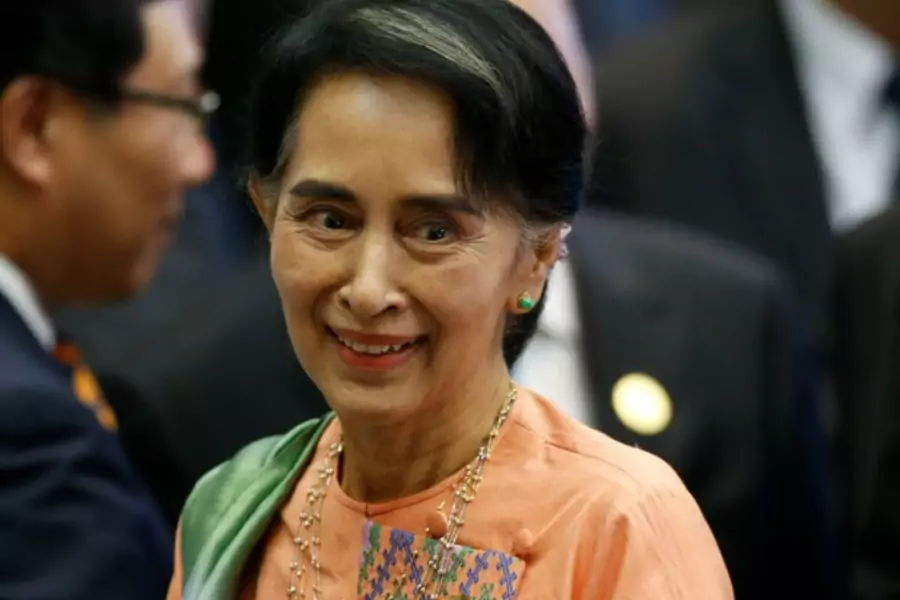What Aung San Suu Kyi Hopes to Gain From Her U.S. Visit

Later this week, Myanmar State Counselor, and de facto head of government, Aung San Suu Kyi travels to the United States. She will address the United Nations General Assembly and will meet with President Barack Obama in the White House this Wednesday. She also will hold meetings with a range of other U.S. officials, Myanmar specialists, and companies. As James Hookaway of the Wall Street Journal notes, the trip clearly solidifies Aung San Suu Kyi’s role as de facto head of government, although she is not technically president. And Aung San Suu Kyi has been careful to balance her state diplomacy, visiting China last month before Myanmar’s national peace conference, and in advance of her trip to the United States. She also has visited other powers important to Myanmar such as Thailand.
What does the Myanmar leader hope to gain from this trip to the United States? For one, according to numerous Myanmar officials, she hopes to gain clearer support from the Obama administration for her approach to handling the ongoing tensions in western Rakhine State. There, where conflict has erupted between Buddhists and Muslims since the early 2010s, Aung San Suu Kyi’s seeming indifference to the plight of the Muslim Rohingya initially damaged her image in the United States, and globally. Now, she has asked former United Nations Secretary General Kofi Annan to head up a commission tasked with investigating the violence in Rakhine State, where more than 140,000 Rohingya have been driven out of their homes, with many living in displaced persons camps in the state now. Some human rights groups, like Fortify Rights (a group focusing on the Rohingya and Rakhine State) have welcomed the appointment of Annan, which potentially gives the investigation more credibility. The appointment of Annan also has helped rehabilitate Aung San Suu Kyi’s image among human rights groups in the United States and elsewhere.
More on:
But Annan is still working on a commission---it will not have any powers to enforce any recommendations it makes, as the former UN Secretary General himself has made clear. The Obama administration likely will press Aung San Suu Kyi to be clearer about how she will address many of the entrenched social and economic problems in Rakhine State, including land grabbing, which remains a persistent problem.
Second, Aung San Suu Kyi will push for enthusiastic U.S. government support of her strategy for achieving a permanent and national peace. The peace conference organized by the National League for Democracy (NLD) government last month received only a mixed reception from many of the remaining ethnic insurgencies; the largest, the United Wa State Army (UWSA), had its representatives walk out of the meeting. U.S. officials should press Aung San Suu Kyi for clearer indications of how she plans to handle the next meetings of the national peace dialogue, how she plans to woo back the UWSA and other insurgents to the peace table, and what her vision is for some kind of future, more federal Myanmar.
Aung San Suu Kyi also will likely want the Obama administration, and U.S. investors, to publicly support the NLD’s economic strategy. Although this remains relatively vague, the new Myanmar government has rolled out a strategy that seems to prioritize making Myanmar’s agricultural sector more productive, improving macroeconomic stability, making the financial sector more stable, and addressing endemic corruption. However, the government has not made clear how it plans to address several extremely important economic issues, including the continuing problem of land confiscation, and the lack of clear land tenure laws. The NLD government has created a commission to assess land tenure challenges, but some Myanmar rights groups worry that the commission will simply bury land disputes. Even more worryingly, the government also has offered no clear direction about how it will address the fact that groups linked to current and past armed forces leaders have control over many sectors of the Myanmar economy. The ongoing influence of the armed forces over so much of the economy is a factor that adds to graft, opaque business dealings, land tenure problems, and many other challenges.
Aung San Suu Kyi also likely will push the White House for further reductions in U.S. sanctions, as a broader sign of U.S. support for the direction of Myanmar’s democratization. Last spring, the Obama administration relaxed some remaining U.S. sanctions on Myanmar, after the big NLD election victory last year and Aung San Suu Kyi’s successful formation of a government. Opinion within the NLD remains divided on how far Aung San Suu Kyi should push, but some sanctions relief would be seen by most NLD members---and probably most Myanmar citizens---as another signal of support for the government’s political and economic programs.
More on:
 Online Store
Online Store